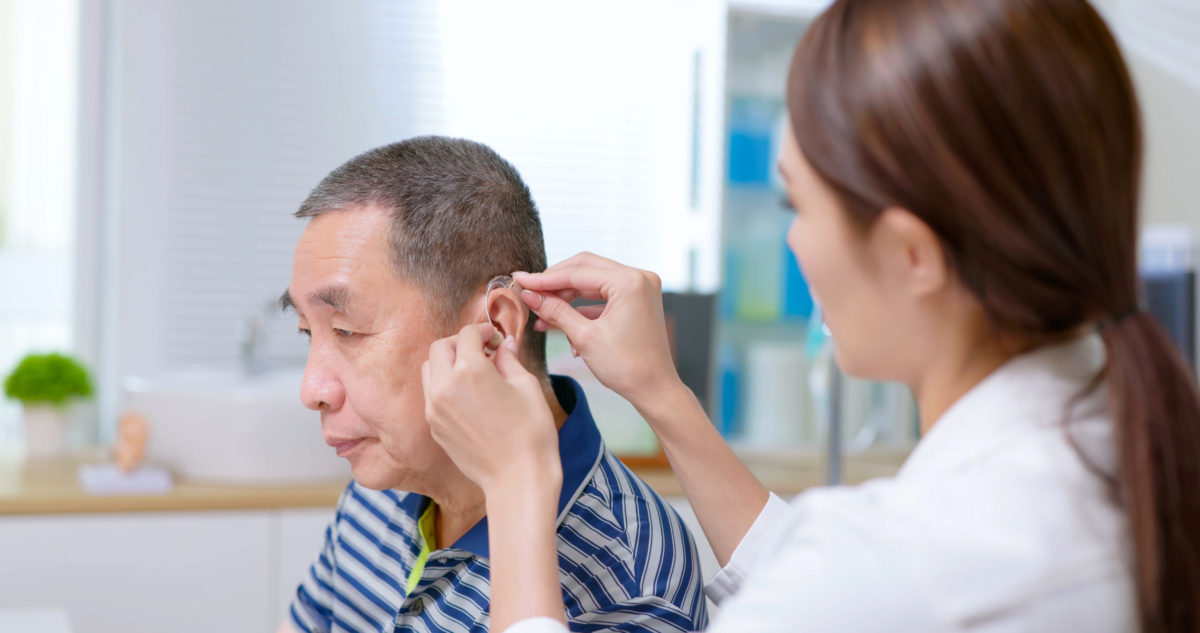Take steps to assure you can hear loud and clear
By Mary Anna Rodabaugh
As we age, we may experience hearing loss. This can happen for a variety of reasons.
“Hearing loss can be caused by many different things, some of which are benign and easily treatable, such as impacted wax in the ear canal or middle ear fluid that could be addressed by a physician,” says Dr. Lindsay Bondurant, director of the Pennsylvania Ear Institute of Salus University. “On the other hand, some hearing loss is caused by significant medical issues, such as tumors or pathologies of the auditory nerve; for these situations, it’s important to have a thorough evaluation by an audiologist who can spot the signs that would lead to a referral to an otolaryngologist (ears, nose and throat specialist).”
When to get a hearing test
A common symptom of hearing loss is tinnitus, which causes a ringing or buzzing noise in the ears when there is no sound present. For many patients, the underlying issue is hearing loss. Once addressed, the symptoms are reduced.
Hearing loss tends to happen gradually. If you find it difficult to participate in conversations or if you have difficulty hearing, it may be time to schedule a hearing exam with an audiologist.
“What many adults with hearing loss tell us is that they can hear people talking, but it’s not always clear,” Dr. Bondurant says. “It might sound like people are mumbling all the time. Those are classic signs of hearing loss in the higher pitches, which is where many of the sounds are found that make speech easier to understand.”
The hearing exam
After discussing your symptoms and family medical history, your hearing specialist will conduct a hearing exam. First, you will undergo a physical examination. Your practitioner will inspect your ears and ear canals for signs of blockage or earwax buildup.
Next, you will put on headphones and listen for a series of tones at different volumes. When you hear a tone, you will identify that you heard the sound by raising your hand or tapping your headphone. You may also experience a different test where you’ll listen to a series of words that are spoken at various distances and at different volumes.
After your tests are complete, your hearing specialist will determine your results and discuss treatment options with you.
Hearing devices
If you are diagnosed with hearing loss or hearing impairment, your practitioner may prescribe a device to help. The most common style of hearing device is a receiver in the ear, which is a small hearing aid that sits behind the ear. It is attached by a small wire to a speaker in the ear. The hearing aid has a shell that fills in the outer part of the ear.
“(Today’s hearing aids) are very unobtrusive and cosmetically appealing,” Dr. Bondurant says. “They can provide a great boost in the frequency range where most hearing losses occur.”
There are also behind-the-ear (BTE) hearing aids that have most parts enclosed in a plastic case that rests behind the ear. The case is connected to an earpiece with clear tubing. They are easy to clean and handle. In-the-ear models are larger than behind-the-ear hearing aids.
Completely-in-the-canal (CIC) aids are the smallest option available. They are great for cosmetic reasons but may be difficult to handle due to their small size.
Over-the-counter options
Today, more hearing devices are becoming available without a prescription. While this option may seem convenient, if you suspect you are experiencing hearing loss, you should schedule a hearing exam before selecting an over-the-counter (OTC) hearing aid. Since hearing loss can be attributed to a variety of factors, it is important to receive a correct and comprehensive diagnosis to determine the best route for treatment.
“I strongly urge anyone who thinks they have hearing loss to see an audiologist before making any decisions about amplification,” Dr. Bondurant says. Hearing loss originating in the inner ear, such as age-related hearing loss, may require more comprehensive management in addition to the correct amplification device.
Dr. Bondurant notes OTC hearing aids are only appropriate for mild to moderate hearing loss, and they require the patient to be able to manage their own technology with minimal assistance. Patients have a better experience and better outcomes with prescription hearing aids under the care of a hearing specialist.
Paying for it
Always check with your insurance to determine if it will cover part or all the cost of the hearing aid.
If you are a military veteran, you may be able to secure financial assistance for your hearing aid through your local Veterans Affairs Office. For benefit information, call 215-686-3256 or visit phlVeterans.com.
For more information about hearing loss, go to nia.nih.gov/health/hearing-loss-common-problem-older-adults. For information and resources available in the Philadelphia area, contact the Deaf-Hearing Communication Centre at 610-604-0450, option 4 and dhcc.org.
Mary Anna Rodabaugh is a writer, editor and writing coach




